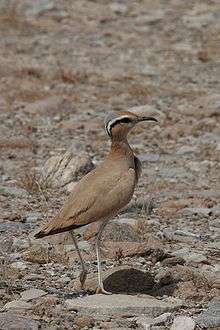Cream-coloured courser
| Cream-coloured courser | |
|---|---|
_Tal_Chhapar%2C_Churu%2C_Rajasthan%2C_India_February_15th%2C_2013.jpg) | |
| Adult Cursorius cursor from Tal Chhapar Sanctuary, Churu, Rajasthan, India | |
| Scientific classification | |
| Kingdom: | Animalia |
| Phylum: | Chordata |
| Class: | Aves |
| Order: | Charadriiformes |
| Family: | Glareolidae |
| Genus: | Cursorius |
| Species: | C. cursor |
| Binomial name | |
| Cursorius cursor (Latham, 1787) | |

.jpg)
The cream-coloured courser (Cursorius cursor) is a wader in the pratincole and courser family, Glareolidae. Both parts of the scientific name derive from Latin cursor, "runner", from currere, "to run".[2]
Unlike most waders, these are birds of dry open country, preferably semi-desert, where they typically hunt their insect prey by running on the ground.
Range
These coursers are found in Canary Islands, Cape Verde, North Africa and southwest Asia. Their two eggs are laid in a ground scrape. The breeding season extends from February to September,[3] but they may breed also in autumn and winter when local conditions (especially rainfall) are favourable.[4] They are partially migratory, with northern and northwestern birds wintering in India, Arabia and across the southern edge of the Sahara. Some birds also breed in the southern desert regions in northwestern India and Pakistan.[5]
They are rare north of the breeding range, but this species has occurred as far away as Finland, Ireland and Great Britain.
Description
These birds have long legs and long wings. They have slightly downcurved bills. The body plumage is sandy in colour, fading to whitish on the lower belly. The upperwing primary feathers and the underwings are black. The crown and nape are grey, and there is a black eyestripe and white supercilium.
In flight this species resembles a pratincole with its relaxed wingbeats, pointed wings and dark underwings.
Subspecies
There are three subspecies of the cream-coloured courser:[6]
- C. c. cursor, (Latham, 1787): Canary Islands, North Africa to Iraq
- C. c. bogolubovi, (Zarudny, 1885): southeast Turkey to northwest India
- C. c. exsul, (Hartert, 1920): Cape Verde Islands
Taxonomic note
Hayman's Shorebirds treats the east African form littoralis as a race of the Somali courser rather than of cream-colored.[7] Some authorities in turn consider the Somali, Burchell's and cream-coloured coursers to be conspecific.
References
- ↑ BirdLife International (2012). "Cursorius cursor". IUCN Red List of Threatened Species. Version 2013.2. International Union for Conservation of Nature. Retrieved 26 November 2013.
- ↑ Jobling, James A (2010). The Helm Dictionary of Scientific Bird Names. London: Christopher Helm. p. 125. ISBN 978-1-4081-2501-4.
- ↑ Maclean, G.L. 1996. Family Glareolidae (coursers and pratincoles). In: J. del Hoyo, A. Elliott & J. Sargatal (eds), Handbook of the Birds of the World (Vol. 3 - Hoatzin to Auks), pp. 364–383. Lynx Edicions, Barcelona.
- ↑ Amezian, M., Bergier, P. & Qninba, A. 2014. Autumn-winter breeding by Cream-coloured Coursers Cursorius cursor is more common than previously reported. Wader Study Group Bulletin 121: 177-180.
- ↑ Rahmani, Asad R.; Manakadan, Ranjit (1989). "Breeding records of Creamcoloured Courser Cursorius cursor cursor (Latham) from India". Journal of the Bombay Natural Historical Society. 86 (3): 447–448.
- ↑ "'Coursers, noddies, gulls, terns, auks and sandgrouse". International Ornithological Congress. Retrieved 8 January 2015.
- ↑ Hayman, Peter; Marchant, John; Prater, Tony. Shorebirds: An Identification Guide. Houghton Mifflin Harcourt. ISBN 0-7099-2034-2.
External links
| Wikimedia Commons has media related to Cursorius cursor. |
| Wikispecies has information related to: Cursorius cursor |
- BirdLife species factsheet for Cursorius cursor
- "Cursorius cursor". Avibase.

- "Cream-coloured courser media". Internet Bird Collection.
- Cream-coloured courser photo gallery at VIREO (Drexel University)
- Interactive range map of Cursorius cursor at IUCN Red List maps
- Audio recordings of Cream-coloured courser on Xeno-canto.
